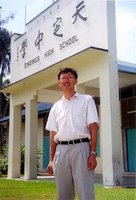25-year-old Teresa serves as an international aid worker with World Vision currently working out of Timor-Leste, which has only in recent years secured independence from Indonesia.
Teresa believes that those stuck in the cycle of poverty deserve a better life As aid workers, poverty stricken countries, natural disaster areas and war zones are their workplaces.Teresa actually counts herself lucky in Timor for "At least I have running water, gas and electricity which was not the case in Indonesia." Like Suzanne Lee who was profiled here a while back, Teresa clearly has the determination to pursue her own dreams, making sure that they get fulfilled through her own efforts for "Lee has always wanted to be engaged in something meaningful."
Lee had spent the previous 12 months in both Indonesia and Cambodia volunteering her time and skills in local aid assistance programmes. She was involved with developing English radio programmes and also assisted with medical clinics in villages.
So what does her job involve?
There are still a large number of displaced children in Timor Leste. World Vision has long-term projects in Food and Livelihood Security, Water and Sanitation, Health, Youth Development, Child Protection and Peacebuilding. I help out across most of them.Teresa loves her job because she gets to play a "part in opening up opportunities for people to improve their situation can be very rewarding."
Basically, a small part of my role is to help ensure that World Vision’s emergency response is part of a collaborative approach because coordination between different NGOs and aid agencies is crucial during emergency situations.
Apart from dealing with crisis relief, we are also involved in long-term development projects. These projects are fundamental to our role here as International Development Workers. While emphasis is always on emergency short-term relief, long-term development work in contrast, is more crucial towards addressing root causes of issues such as poverty and violence.
One of the many projects that I am part of is the Inter-agency Watsan Working Group, which provides water and sanitation to the IDP camps. I help coordinate the distribution of water and sanitation contingency items such as tarpaulins, rope and soap to other aid agencies which then distribute them to refugees at the IDP camps.
I have to ensure that projects are progressing well and gauge how the affected community is feeling about these projects. In the midst of all this, I also assist local staff increase the quality of programmes and their English capabilities.
This can involve securing funding for a health education project so that communities can learn how to avoid getting sick from preventable diseases. When I hear stories of how our projects have helped communities, such as giving them access to clean water or increasing their agricultural crops, I feel excited. It’s nice to know that there is change happening.Yes, Teresa gets paid for her role as an aid worker. However, that still doesn't take away the immense sacrifices she has made being away from home, living in less then ideal conditions and getting her hand "dirty".
Everyone of us young Malaysians have our part to play in this world, and I certainly hope that there are many more who will take the path less trodden, inspired by gutsy youths like Teresa Lee. ;)


